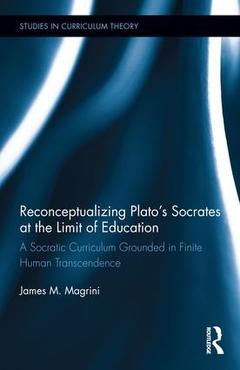Reconceptualizing Plato’s Socrates at the Limit of Education A Socratic Curriculum Grounded in Finite Human Transcendence Studies in Curriculum Theory Series
Auteur : Magrini James M.

Bridging the gap between interpretations of "Third Way" Platonic scholarship and "phenomenological-ontological" scholarship, this book argues for a unique ontological-hermeneutic interpretation of Plato and Plato?s Socrates. Reconceptualizing Plato?s Socrates at the Limit of Education offers a re-reading of Plato and Plato?s Socrates in terms of interpreting the practice of education as care for the soul through the conceptual lenses of phenomenology, philosophical hermeneutics, and ontological inquiry.
Magrini contrasts his re-reading with the views of Plato and Plato?s Socrates that dominate contemporary education, which, for the most part, emerge through the rigid and reductive categorization of Plato as both a "realist" and "idealist" in philosophical foundations texts (teacher education programs). This view also presents what he terms the questionable "Socrates-as-teacher" model, which grounds such contemporary educational movements as the Paideia Project, which claims to incorporate, through a "scripted-curriculum" with "Socratic lesson plans," the so-called "Socratic Method" into the Common Core State Standards Curriculum as a "technical" skill that can be taught and learned as part of the students? "critical thinking" skills. After a careful reading incorporating what might be termed a "Third Way" of reading Plato and Plato?s Socrates, following scholars from the Continental tradition, Magrini concludes that a so-called "Socratic education" would be nearly impossible to achieve and enact in the current educational milieu of standardization or neo-Taylorism (Social Efficiency). However, despite this, he argues in the affirmative that there is much educators can and must learn from this "non-doctrinal" re-reading and re-characterization of Plato and Plato?s Socrates.
Introduction: Plato’s Socrates: Learning and Education in the Dialogues
Chapter One: The Programmatic Curriculum of Plato’s Republic: Re-Conceiving the Role of the Dialectic in the Education of Philosopher Rulers
Chapter Two: Understanding Plato as a Non-Doctrinal Philosopher: Re-Conceiving Plato’s Socrates in Education Through "Third Way" Scholarship
Chapter Three: Socrates’ Protreptic Philosophical Practice: The Ontology of the Zetetic Quest to Understand the Virtues
Chapter Four: The Difficult Practice of the Elenchus-Dialectic: The Ethical "Character" of Learning and the "Politics" of the Soul
Chapter Five: The Dialectic and Dialogue of Plato’s Socrates: Learning Through the Hermeneutic Understanding of Virtue
Epilogue: Socratic Resonations: At the Limit of Education
James M. Magrini is Adjunct Professor of Philosophy and Ethics, College of Dupage, USA.
Date de parution : 12-2016
15.2x22.9 cm
Date de parution : 09-2020
15.2x22.9 cm
Thème de Reconceptualizing Plato’s Socrates at the Limit of... :
Mots-clés :
Plato’s Socrates; Socratic Teaching; James M; Magrini; Socratic Learning; Plato; Finite Transcendence; Socrates; Doctrinal Readings; philosophy of education; Socratic Dialectic; phenomenology; Philosophical Hermeneutics; hermeneutics; Philosophical Understanding; ontology; Socratic Seminar; curriculum studies; Socratic Method; classical studies; Plato’s Dialogues; Platonic studies; Hoi Polloi; Ancient philosophy; Philosopher Rulers; Young Men; philosophy; Dialectic Examination; Hypothetical Method; Platonic Scholarship; Logon Didonai; Non-doctrinal Approach; Socratic Ignorance; Propositional Certainty; Ontological Finitude; Ethical Disposition; Plato’s Philosophy; Socratic Practice



